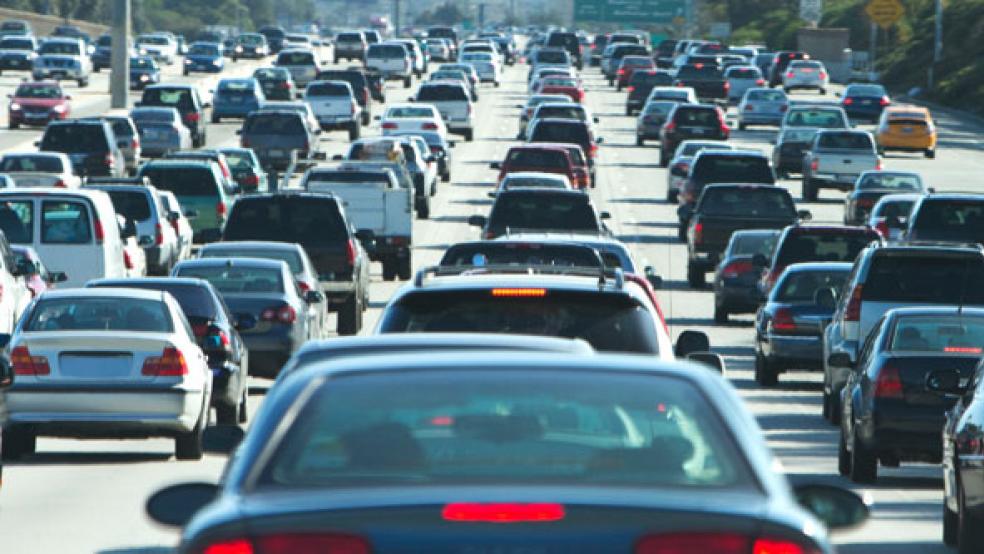A group of mayors urged lawmakers on Tuesday to redirect infrastructure funding from states to metropolitan areas to alleviate congestion, create jobs, and rebuild the country’s crumbling public transit systems. The mayors also advocated for more authority over how federal transportation dollars are spent. The U.S. Conference of Mayors (USCM), a nonpartisan organization comprised of mayors from cities with populations of 30,000 or more, released a 176-city survey, which said that most metropolitan area transit systems are already at capacity, and that aging roads and bridges undermine cities’ ability to meet future economic benchmarks.
Atlanta Mayor Kasim Reed, chair of the USCM transportation committee, said infrastructure investment is one issue that has historically been bipartisan and urged Congress to broaden the debate on the deficit to include it, claiming it’s a generator of economic growth.
“The findings are intended to shake the national conversation,” Reed said on Tuesday in Washington. “We’re not going to be left on the sidelines now that the debate has shifted to deficit reduction. The long-term productivity of transportation infrastructure spending is greater when it is invested where economic growth will occur, which is in the metropolitan areas.”
Andrew Herrmann, president-elect of the American Society of Civil Engineers (ASCE), estimates that between 20,000 to 35,000 jobs are created per $1 billion dollars invested in infrastructure.
Robert Puentes, senior fellow at the Brookings Institution, agrees with the Conference of Mayors and says more authority and funding should be given to cities to make decisions based on their needs. He proposes that states develop a new partnership with metro areas to raise revenue, reduce bureaucracy and accelerate project delivery.
“For our nation to recover economically, we have to focus on our economic engines, which are these metro areas generating 90 percent of GDP and jobs,” Puentes said. “It’s not just about the cash the mayors want, but the ability to choose projects that matter, to help areas thrive,” he added. “Many states take a peanut butter approach and spread it around thinly, instead of prioritizing it to these metro areas.”
Priorities Would Change
If the mayors had greater control over federal transportation funds, they suggest, their priorities would be different. They oppose, for example, state-controlled highway expansion projects such as the infamous $398 million ‘Bridge to Nowhere’ proposal to connect the 50 residents of Gravina Island to the mainland of Alaska. In 2009, the ASCE gave the country’s infrastructure a “D” grade and said a five-year investment plan of $2.2 trillion was needed to fix crumbling infrastructure. The nation’s transportation infrastructure system contributes $244 billion in total economic activity to the nation’s gross domestic product, according to the ASCE.
Seventy-five percent of the mayors said they would support an increase in the federal gas tax if a greater share of federal funds were invested in bicycle and pedestrian projects. The federal fuel tax, which is 18.4 cents per gallon, is often dedicated to transportation projects and hasn’t been raised since 1993. Each state has a separate gas tax, which is added on to the federal tax, according to the American Petroleum Institute. Specific funding requests won’t be made until after the new transportation bill passes Congress later this year. The current six-year $286 billion federal surface transportation bill was extended through the end of September 2011, when the fiscal year ends.
The House Committee on Transportation and Infrastructure is drafting new long-term legislation that would continue funding transportation programs. It is unclear if the same level of funding will be applied in the new bill. However, it does aim to better use existing resources, said Justin Arclerode, communications director for the Transportation and Infrastructure Committee.
In additional to the transportation bill, a total of $98,325,000,000 in stimulus funds was awarded to state and federal transportation and infrastructure projects in 2009.
Related Links:
U.S. Mayors Want More Say in Federal Transportation Funding (Progressive Railroading)
Highway Bill Draft High on Tolls, User Fees (Fleet Owner)


